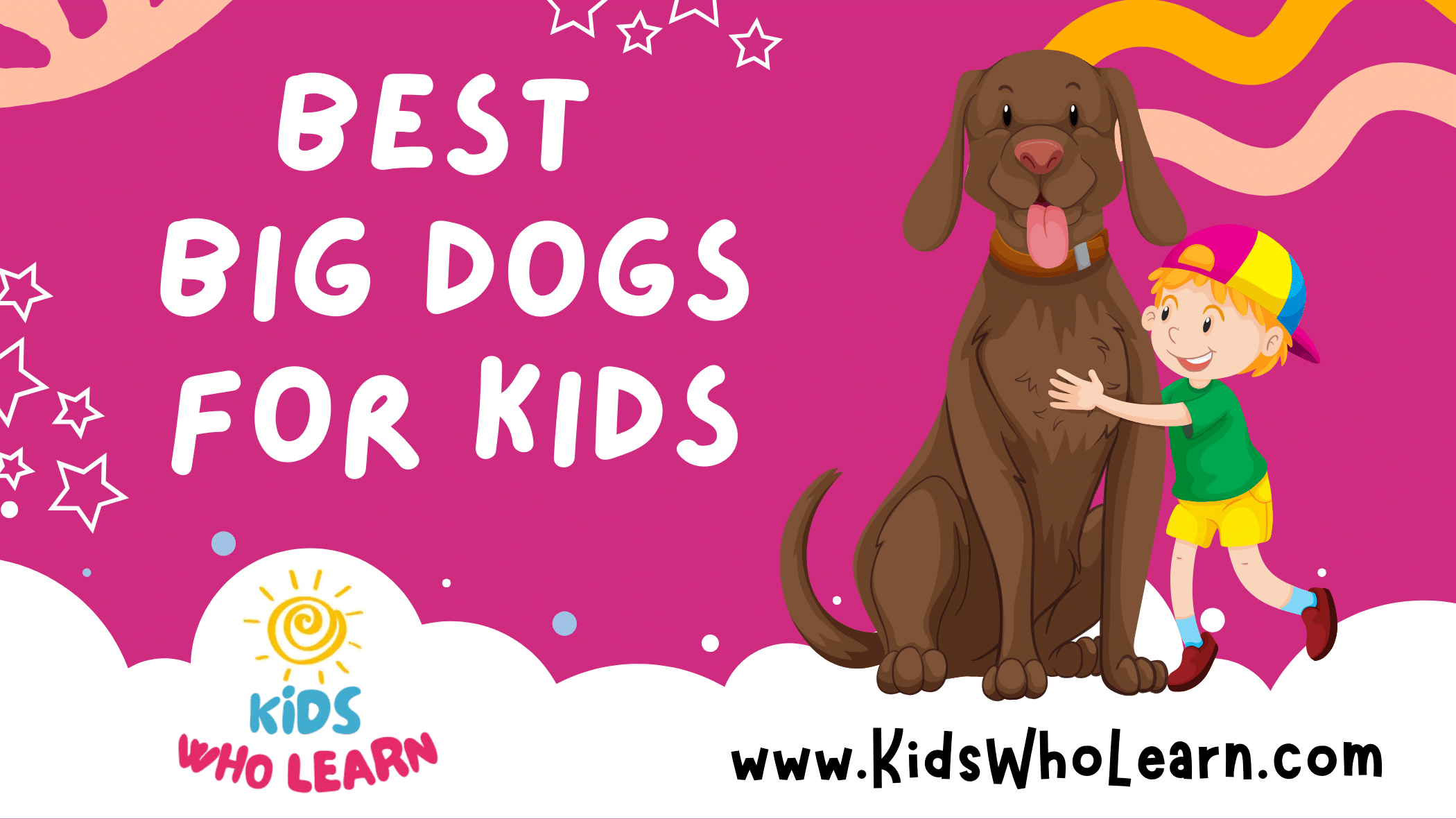Selecting the best big dog breeds for children can be an exciting yet daunting task for families seeking to add a gentle giant to their household. Large dog breeds often have a reputation for being protective and loving, traits that can make them excellent companions for children. It’s crucial to consider not only the size but also the temperament, energy level, and care requirements when choosing a dog for a family with kids. Some large breeds are known for their patient and gentle nature, which can be particularly beneficial in households with younger children.
When evaluating dog breeds, keep in mind that each dog is an individual with its unique characteristics and personality. However, breeds generally have certain traits in common. A family dog should ideally be adaptable, trainable, and able to thrive within the dynamics of your household routines. Proper socialization, training, and care are pivotal in ensuring that your large breed dog becomes a well-behaved and integral member of the family. Always remember that while the breed can suggest general attributes, the individual dog’s personality and the training it receives will be the determining factors in how well it integrates with your family and interacts with your children.
Key Takeaways
- A big dog’s temperament and energy level are as important as its size for compatibility with kids.
- Individual dogs within a breed can vary, but proper training and socialization are key for a good family fit.
- Big dog breeds require specific care and attention to thrive in a family environment.
Choosing the Right Breed
When selecting a big dog breed for your family, it’s essential to consider specific characteristics that align with your lifestyle. The right breed should be a harmonious match for your home environment and your children.
Important Characteristics
Size: Dogs such as the Labrador Retriever and Golden Retriever are large enough to handle play without being overpowering.
Energy Level: Look for a breed with a manageable energy level like the Bernese Mountain Dog; they’re active without being hyperactive.
Intelligence: Breeds such as the Standard Poodle are smart, making them easier to train and great companions for children.
Patience and Temperament: Newfoundland dogs are known for their patient and sweet nature, ideal for families with kids.
| Breed Attributes | Example Breeds |
|---|---|
| Affectionate | Labrador Retriever, Golden Retriever |
| Playful | Boxer, Collie |
| Friendly | Newfoundland, Irish Wolfhound |
| Loyal | German Shepherd, Saint Bernard |
| Intelligent | Poodle, Border Collie |
| Patient | Newfoundland, Mastiff |
| Energetic | Labrador Retriever, Boxer |
| Docile | Great Dane, Mastiff |
| Good-Natured | Bernese Mountain Dog, Beagle |
| Affectionate | Golden Retriever, Boxer |
| Even-Tempered | Collie, Bulldog |
| Family-Friendly | Labrador Retriever, Vizsla |
Size and Space Considerations
- Indoor Space: Ensure your living space can comfortably accommodate the breed’s size.
- Outdoor Space: Breeds like the Labrador and Golden Retriever require ample outdoor space to expend energy.
Temperament
| Breed | Typical Temperament |
|---|---|
| Labrador Retriever | Friendly, affectionate, energetic |
| Golden Retriever | Intelligent, even-tempered, family-friendly |
| Newfoundland | Gentle, patient, docile |
| Boxer | Playful, good-natured, loyal |
| Collie | Affectionate, friendly, intelligent |
| Irish Wolfhound | Patient, loyal, good-natured |
| German Shepherd | Loyal, intelligent, protective |
| Saint Bernard | Friendly, patient, good-natured |
| Poodle | Intelligent, energetic, friendly |
| Mastiff | Docile, affectionate, good-natured |
| Bernese Mountain Dog | Affectionate, loyal, good-natured |
| Beagle | Friendly, curious, good-natured |
| Bulldog | Docile, friendly, loyal |
| Vizsla | Affectionate, energetic, family-friendly |
In selecting a breed, you should look for one that displays a temperament that is conductive to family life and interactions with children.
Best Big Dog Breeds for Kids
When selecting a big dog breed for your family, it’s essential to choose one that’s known for being affectionate, patient, and good with children.
Labrador Retriever
Labrador Retrievers are highly intelligent and loyal companions. They possess a friendly nature and an enthusiasm for play, making them suitable for active kids.
Golden Retriever
Golden Retrievers are similar to Labradors in terms of their affectionate and playful temperament. They are patient dogs, often making great family pets due to their gentleness with children.
Boxer
Boxers are energetic and playful, and they are known for their protective instincts. Their loyalty makes them excellent companions for you and your family.
Collie
Collies are intelligent and alert, known for their gentleness and ease of training. They are loyal protectors of kids and adapt well to family life.
Standard Poodle
Standard Poodles stand out with their intelligent and active nature. Poodles are also hypoallergenic, making them suitable for families concerned with allergies.
Bernese Mountain Dog
Bernese Mountain Dogs are known for their calm and docile personalities. They are gentle, affectionate, and good with children, embodying a strong sense of loyalty to their families.
Newfoundland
Newfoundlands are true gentle giants, displaying a remarkable calmness and docility. They are great with children and known to be protective of their family.
Great Dane
Great Danes are gentle despite their size, and are known as friendly and patient pets. They can be a calm presence around kids when appropriately trained.
Bull Terrier
The Bull Terrier is affectionate and playful, making a sturdy playmate for kids. Their loyalty and protectiveness make them vigilant companions in the home environment.
Alaskan Malamute
Alaskan Malamutes are powerful, athletic dogs with a patient, playful spirit. They are affectionate with family and can be a loyal member of your household.
Saint Bernard
Saint Bernards are famous for their gentle nature and patience, standing as iconic gentle giants among dog breeds. They are protective and good with children, often displaying profound loyalty.
Essential Training and Care
To ensure your big dog remains a loving addition to your family, prioritizing their training and care is crucial. This encompasses their health and exercise needs, appropriate nutrition, consistent training, and ongoing socialization efforts.
Health and Exercise Requirements
Daily Physical Activity: All large dog breeds need regular exercise to maintain their health and manage their energy levels. For instance:
- Labrador Retrievers: At least 30-60 minutes of vigorous exercise per day.
- German Shepherds: Preferably 2 hours of physical activity per day combining walks with play sessions.
Routine Check-Ups: Regular vet visits are essential to keep your dog in good health. Big breeds may have breed-specific health issues that require attention and monitoring.
Nutrition and Diet
Caloric Intake and Meal Scheduling:
- Golden Retrievers: Typically require approximately 1,500-2,000 calories per day, spread across two meals.
- Saint Bernards: Due to their size, may need about 2,900-4,000 calories daily, following a carefully measured feeding schedule to prevent obesity.
Essential Nutrients:
- Proteins and fats are crucial for energy and growth.
- Calcium and phosphorus must be balanced, especially in growing large breed puppies, to support bone health.
Training and Obedience
Establishing Rules and Boundaries:
- Begin obedience training early, focusing on basic commands such as sit, stay, and come.
- Use positive reinforcement techniques to encourage good behavior.
Consistent Practice:
- Dedicate time each day for training sessions to reinforce commands and correct behavior.
- Remain patient and persistent, as large dogs can take time to train due to their intelligence and playfulness.
Socialization and Family Integration
Introduce New Experiences:
- Gradually expose your dog to different people, pets, and environments to foster adaptability and prevent anxiety.
Encourage Interaction:
- Involve your dog in family activities and allow them to play with children under supervision to build strong bonds and integrate them into the family unit.
By maintaining these practices, you can create a harmonious and balanced relationship with your big dog.
Possible Challenges and Considerations
When considering big dogs for kids, you need to recognize the specific challenges of managing large dogs, understanding breed-specific needs, and the extensive commitment involved.
Managing Large Dogs
Managing large dog breeds requires a commitment to proper training and socialization. Due to their size, these dogs can accidentally knock over small children if not properly trained. Continuous training reinforces obedience, ensuring that your large dog is both affectionate and docile, rather than boisterous and overwhelming.
Understanding Breed-Specific Needs
Each breed has unique needs that must be met to ensure a harmonious household. For example, an energetic breed like a Labrador Retriever will need ample exercise and space to stay active, while a more dignified and watchful breed like a Great Dane will require a calm environment and may have different exercise requirements.
| Breed | Common Needs | Personality Traits |
|---|---|---|
| Labrador | Exercise, training | Loyal, energetic |
| Great Dane | Space, moderate exercise | Dignified, watchful |
| Saint Bernard | Companionship, grooming | Affectionate, docile |
Long-Term Commitment
Owning a large dog is a long-term responsibility. Not only do you commit to the daily care that includes feeding, walks, and grooming, but also to the potential decade or more of companionship. Recognizing the active lifestyle and financial cost of healthcare for a larger breed is crucial for a fulfilling relationship between your family and the dog.
Conclusion
When choosing the primary four-legged addition to your household, prioritizing family-friendly qualities is essential. Labrador Retrievers and Golden Retrievers stand out for their innate affection, intelligence, and sociability. These breeds are not only loyal companions but also show a remarkable balance of being playful yet protective, ensuring a safe and lively environment for your kids.
| Breed | Key Traits |
|---|---|
| Labrador Retriever | Energetic, Intelligent, Friendly |
| Golden Retriever | Affectionate, Patient, Great with Kids |
Your preferred canine should integrate seamlessly into your family dynamics. Labs and Goldens thrive on interaction and are sufficiently active to keep up with energetic youngsters. Their versatile nature makes them adaptable to various roles, from a running partner to a comforting presence during down-time.
It’s your responsibility to ensure that the chosen dog’s size and energy level match your family lifestyle. Whether for a game of fetch or a leisurely walk, the right big dog can enrich your home with love and laughter. Remember, the success of integrating a new pet into your family hinges on commitment to proper training and exercise.
Your selection should be a blend of affectionate behavior and an ability to teach and learn from each other – qualities that both the Labrador and Golden Retriever possess in abundance. With proper care and training, these breeds can be exceptionally loyal and affectionate members of your family, fostering a nurturing environment for everyone, especially kids.
Additional Resources
When selecting the best big dog for your family, numerous resources are at your disposal to guide your decision. To assist in researching dog breeds, you can consult the American Kennel Club (AKC) website. It showcases a comprehensive list of breeds with detailed profiles, which will help you understand the temperament and care requirements of each breed. Visit their official site at www.akc.org.
For insights on individual breeds and their compatibility with children, the following books could be valuable:
- “The Complete Dog Book” by the American Kennel Club
- “The Art of Raising a Puppy” by the Monks of New Skete
- “How to Be Your Dog’s Best Friend” by the Monks of New Skete
In seeking a breeder, prioritize those that are committed to ethical breeding practices. You can find reputable breeders through the AKC’s breeder referral search or via the Breed Club websites for specific dog breeds. Always visit the breeder in person, and observe the environment in which the pups are raised.
For training your new family dog, consider enrolling in local obedience classes, which can be a good way to bond with your dog and ensure they are well-behaved around children. Websites like Association of Professional Dog Trainers offer directories to find certified trainers near you.
An organized table of contact information:
| Resource Type | Description | Contact Information |
|---|---|---|
| Organisations | American Kennel Club | www.akc.org |
| Books | Guides on choosing and raising dog breeds | Check local bookstore or online retailers |
| Breeder | Ethical breeders and puppies | Breed Club websites or AKC breeder search |
| Training | Professional dog trainers and classes | apdt.com |
Finally, online forums and social media groups can be places to connect with other dog owners, where you can share experiences and advice on raising big dogs in a family setting.
Frequently Asked Questions
In this section, you’ll find specific insights about large dog breeds that are compatible with children and family life. These breeds’ characteristics cater to varying requirements of gentleness, maintenance, indoor living compatibility, friendliness with small pets, low shedding, and overall safety with children.
Which large dog breeds are known for being particularly gentle with children?
The Newfoundland is exceptionally patient and gentle, making it a top choice for a family with children. Similarly, the Bernese Mountain Dog is known for its calm demeanor and friendliness towards kids.
What are some low-maintenance big dog breeds suitable for families?
Mastiffs and Great Danes are surprisingly low-maintenance despite their size. They require minimal grooming and are content with moderate exercise, fitting well into family routines.
Are there any large dog breeds that are well-suited to indoor living?
The Greyhound, often perceived as a racer, actually has a calm temperament and is content with a cozy indoor life, requiring just moderate exercise. Similarly, the Bulldog is a large breed that enjoys indoor environments and short walks.
What are the best big dogs that can get along with smaller pets?
The Golden Retriever and Labrador Retriever are both highly sociable and tend to be receptive to living with smaller pets. They are known for their friendly and non-aggressive nature.
Can you recommend big dog breeds that are friendly and don’t shed much?
The Standard Poodle is a large breed that’s friendly and known for its hypoallergenic coat, which minimizes shedding. The Irish Water Spaniel is another large, affable breed with a curly coat that sheds less.
What characteristics make a large dog breed safe for households with kids?
A suitable large dog for a household with kids typically shows traits of gentleness, patience, and predictability. Stability in temperament and a tolerant personality are also essential, which breeds like the Boxer and Collie exhibit.










